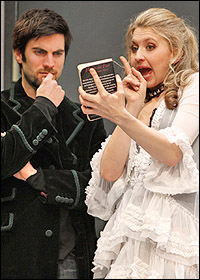SITE GUIDE
SEARCH
REVIEWS
REVIEW ARCHIVES
ADVERTISING AT CURTAINUP
FEATURES
NEWS
Etcetera and
Short Term Listings
LISTINGS
Broadway
Off-Broadway
NYC Restaurants
BOOKS and CDs
OTHER PLACES
Berkshires
London
California
New Jersey
DC
Connecticut
Philadelphia
Elsewhere
QUOTES
TKTS
PLAYWRIGHTS' ALBUMS
LETTERS TO EDITOR
FILM
LINKS
MISCELLANEOUS
Free Updates
Masthead
A CurtainUp Review
Venus in Fur
|
The almighty Lord hath struck him, and hath delivered him into the hands of a woman. —& Book of Judith, 16:7 |

Nina Arianda and Wes Bentley
(Photo: Joan Marcus) |
Based on Venus in Furs, a famous, licentious 1870 novella by Leopold Sacher-Masoch (who gave his name to one half of a sexual disposition, with the Marquis de Sade providing the other part). David Ives does more than drop the plural. His erotic, dangerous, often funny, somewhat repetitious new play riffs on the tale to explore how mores at the crossroads of sex and power vary little from century to century.
Ives’ original idea was to write a literal adaptation of the novella in its time period. Then, as suggested by director Walter Bobbie, he modernized the work, changing its various settings to a spare rehearsal room where Thomas, author and director of a true-to-period adaptation of Venus, is auditioning performers. About to give up for the day, he’s blown away by Vanda, a whirlwind actress who demands a reading. Prepared with not only costumes but a thorough understanding of the character, Vanda gains parity then control through a bold sensuality that slides into delicious cruelty. As they read the play, they get further into their fictional characters — hers is Dunayev, his is Kusemski—- blurring the lines between reality and fantasy. Not only do tables turn several times, but the games they play become more and more sinister as they test their own limits and each other’s. Slowly, inexorably, Vanda, who has changed from her leather mini-skirt into a ruffled, full-length, white 19th-century dress, becomes a dominatrix. Thomas is alternately fascinated, appalled, submissive, even to switching gender roles. "In love as in politics, one partner must rule," he says. "One of them must be the hammer, the other the anvil. I willingly accept being the anvil."
It’s all deliciously decadent as amusement turns to threat. Vanda claims she cannot love someone who will let her dominate him. Then she does precisely that in her pursuit of power. "If love is a battle,"” she says, "then I have a right to be a tyrant. If men act as they do, then I have a right to make a man my puppet."
The games soon become a war of words as well as sex. "I guess you wanted it ambivalent," says Vanda about a line reading. "Ambiguous," corrects Thomas. "What does the play say?" she asks. "
Intriguing as all this is, eventually the word play and the seesawing power games become tiresome. The novel is set against a social milieu, its obsessions reflecting its times. Ives’ more insular two-hander is less encompassing, sacrificing variety. Still, under Bobbie’s direction, the evening has a gallows humor chill. As Vanda, the lustrous Nina Arianda is sensuous and vulnerable, direct and coy. Metamorphosing in a wink from character to character, she rides emotions, accents, posture, even thoughts with ease. It’s a smashing performance that should put her on the map. As Thomas, Wes Bentley has a less chameleon, more reactive role, often having to stand about waiting for Arianda’s fireworks to settle down.
John Lee Beatty’s sterile set, Peter Kaczorowski’s tension-filled lighting, Anita Yavich’s witty costumes and Acme Sound Partners’ ominous sound design make this a slick production. It doesn’t completely work, yet there’s no denying the evening’s guilty pleasures with its frisson of menace and offbeat sense of danger.
|
Venus in Fur by David Ives Directed by Walter Bobbie Cast: Nina Arianda (Vanda/Dunayev), Wes Bentley (Thomas/Kushemski) Scenic Design: John Lee Beatty Lighting Design: Peter Kaczorowski Costume Design: Anita Yavich Sound Design: Acme Sound Partners Stage Manager: Christina Lowe Running Time: 90 minutes, no intermission Classic Stage Co., 136 E. 13th St., N.Y. (212) 352-3101 or www.classicstage.org Tickets: $60 Tuesday through Thursday; $65 Friday through Sunday Performances: Tuesday through Saturday at 8 PM; Saturday and Sunday at 2 PM From 1/16/10; opening 1/26/10; closing 3/07/10-- extended to 3/28/10 Reviewed by David Rosenberg at January 23rd press preview |
|
REVIEW FEEDBACK Highlight one of the responses below and click "copy" or"CTRL+C"
Paste the highlighted text into the subject line (CTRL+ V): Feel free to add detailed comments in the body of the email. . .also the names and emails of any friends to whom you'd like us to forward a copy of this review. You can also contact us at Curtainup at Facebook , Curtainup at Twitter and at our Blog Annex |
|
Subscribe to our FREE email updates with a note from editor Elyse Sommer about additions to the website -- with main page hot links to the latest features posted at our numerous locations. To subscribe,
E-mail: esommer@curtainup.comesommer@curtainup.com
put SUBSCRIBE CURTAINUP EMAIL UPDATE in the subject line and your full name and email address in the body of the message -- if you can spare a minute, tell us how you came to CurtainUp and from what part of the country. |





